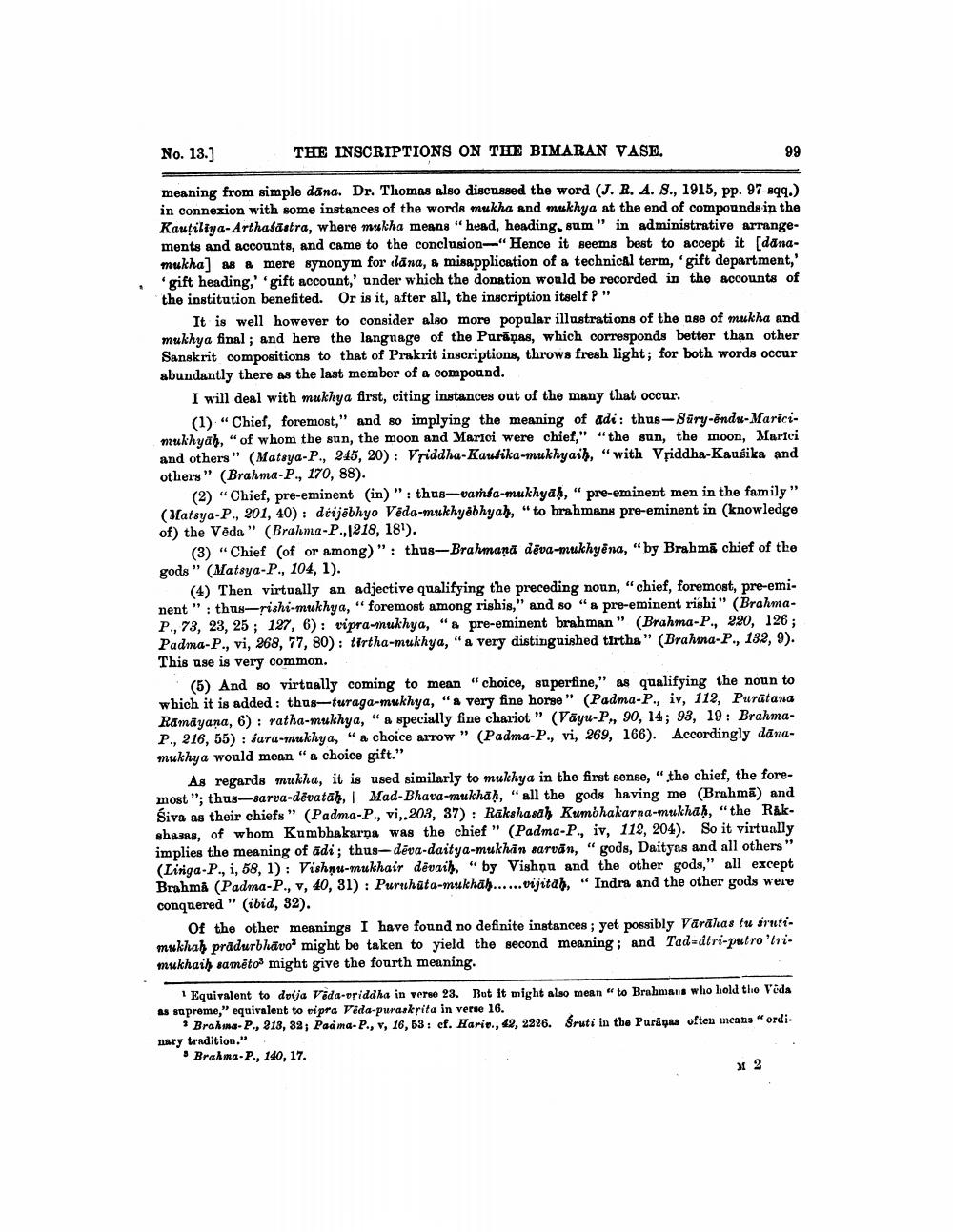________________
No. 13.)
THE INSCRIPTIONS ON THE BIMARAN VASE.
meaning from simple dana. Dr. Thomas also discussed the word (J. R. 4. 8., 1915, pp. 97 sqq.) in connexion with some instances of the words mukha and makhya at the end of compounds in the Kauçiliya-Arthafastra, where mukha means "head, heading, sum" in administrative arrangements and accounts, and came to the conclusion-"Hence it seems best to accept it [danamukha] As a mere synonym for clāna, a misapplication of a technical term, 'gift department,
gift heading,' 'gift account,' under which the donation would be recorded in the accounts of the institution benefited. Or is it, after all, the inscription itself ?"
It is well however to consider also more popular illustrations of the use of mukha and mukhya final; and here the language of the Parāņas, which corresponds better than other Sanskrit compositions to that of Prakrit inscriptions, throws fresh light; for both words occur abundantly there as the last member of a compound.
I will deal with mukhya first, citing instances out of the many that occur.
(1). "Chief, foremost," and so implying the meaning of adi: thus-Sūry-ēndu-Maricimukhyāḥ, "of whom the sun, the moon and Marici were chief," "the sun, the moon, Marici and others" (Matsya-P., 245, 20): Vriddha-Kautika-mukhyail,"with Vriddha-Kausika and othery" (Brahma-P., 170, 88).
(2) "Chief, pre-eminent (in)": thus-vamia-mukhyaḥ, "pre-eminent men in the family" (Matsya-P., 201, 40) : déijēbhyo Vēda-mukhyēbhyah,"to brahmans pre-eminent in (knowledge of) the Veda" (Brahma-P., 218, 18).
(3) "Chief (of or among)" : thus-Brahmanā dēva-mukhyena, " by Brahmă chief of the gods" (Matsya-P., 104, 1).
(4) Then virtually an adjective qualifying the preceding noun, "chief, foremost, pre-eminent" : thus-rishi-mukhya, "foremost among rishis," and so "a pre-eminent rishi" (BrahmaP., 73, 23, 25; 127, 6): vipra-mukhya, "a pre-eminent brahman" (Brahma-P., 220, 126; Padma-P., vi, 268, 77, 80) : tirtha-mukhya, "a very distinguished tirtha" (Brahma-P., 182, 9). This use is very common.
(5) And so virtually coming to mean “choice, superfine," as qualifying the noun to which it is added : thus-turaga-mukhya, "a very fine horse" (Padma-P., iv, 112, Purutang Ramayana, 6) : ratha-mukhya, "a specially fine chariot " (Väyu-P, 90, 14; 93, 19: BrahmaP., 216, 55) : Sara-mukhya, “a choice arrow” (Padma-P., vi, 269, 166). Accordingly dānamukhya would mean " a choice gift."
As regards mukha, it is used similarly to mukhya in the first sense, "the chief, the foremost "; thus-sarva-devatah, Mad-Bhava-mukhāh, "all the gods having me (Brahma) and Śiva as their chiefs" (Padma-P., vi,.203, 37) : Rākshasah Kumohakarna-mukha), "the Råkshans, of whom Kumbhakarna was the chief” (Padma-P., iv, 112, 204). So it virtually implies the meaning of adi; thus-deva-daitya-mukhan sarvän, "gods, Daityns and all others" (Liriga-P., i, 58, 1): Vishnu-mukhair devail,“ by Vishnu and the other gods," all except Brahmå (Padma-P., v, 40, 31) : Paruthata-mukhāh...... vijitah, “Indra and the other gods were conquered " (ibid, 32).
Of the other meanings I have found no definite instances; yet possibly Vārākas tu srutimukhah prădurbhāvos might be taken to yield the second meaning; and Tad=&tri-putro 'trimukhaih samēto might give the fourth meaning.
Equivalent to doija Vida-vriddha in verse 23. But it might also mean "to Brahmans who hold tho Voda As supreme," equivalent to eipra Veda-puraskrita in verse 16.
• Brahma-P., 218, 32; Paama-P., V, 16,53: ef. Harit., 42, 2226. Sruti in the Purapus uften means "ordi. nary tradition."
• Brahma-P., 140, 17.
2




